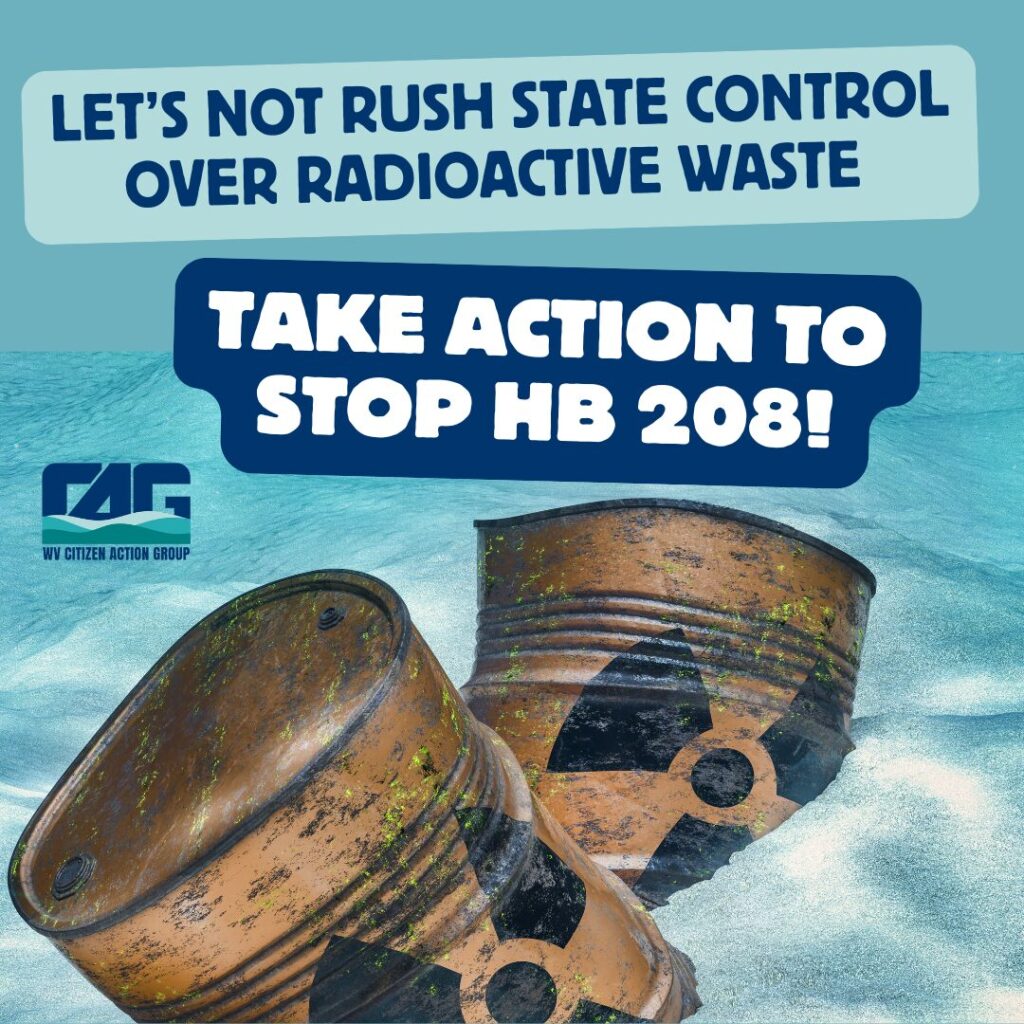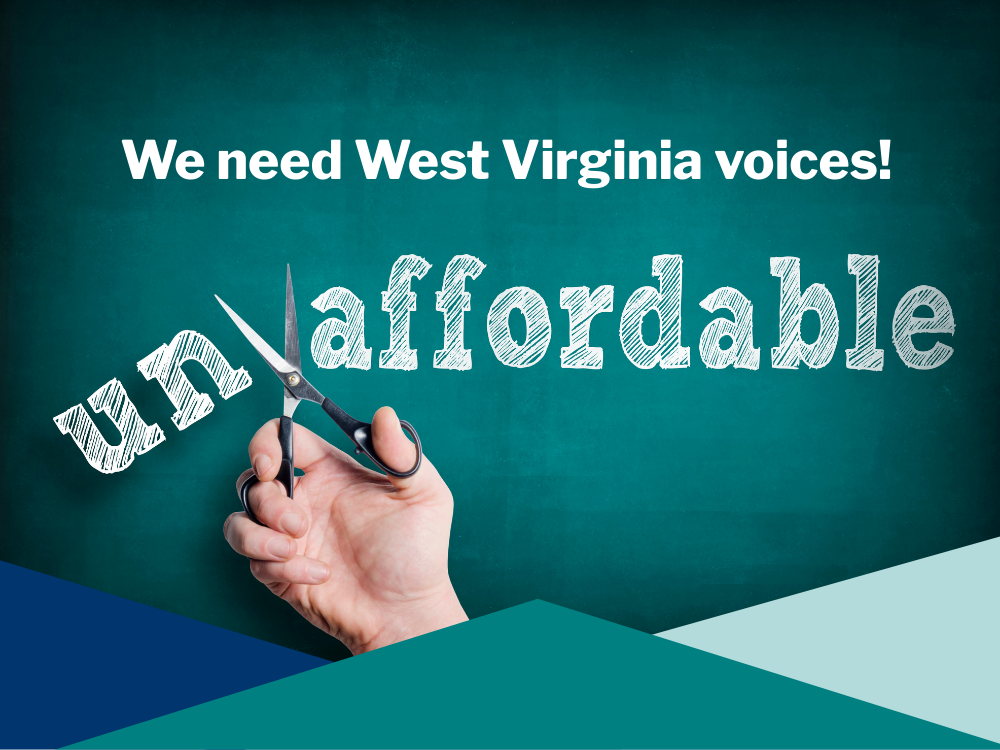FOR IMMEDIATE RELEASE: October 7, 2024
Contacts:
- WV Environmental Council – Kasey Russell, Lobby Team Coordinator, russell.kasey@gmail.com
- WV Climate Alliance – Jillian Welsh, Communications Coordinator, 562.305.5769, jillian@wvcag.org
- WV Citizen Action Group – Jillian Welsh, Communications Coordinator, 562.305.5769, jillian@wvcag.org
- WV Rivers Coalition – Maggie Stange, Communications Manager, 304.637.7201, mstange@wvrivers.org
Rushed Bill Could Expand Radioactive Disposal in West Virginia Communities, Environmental Groups Sound the Alarm
Charleston, WV – The West Virginia Environmental Council, West Virginia Rivers Coalition, West Virginia Citizen Action Group, and the West Virginia Climate Alliance, along with its 20 member organizations, are calling on the State Senate to reject HB 208, the Radiation Control Act, during this Special Session.
HB 208 would give the West Virginia Department of Health authority to regulate radiation, including its storage and disposal, and enter agreements with other states for radioactive waste management. This bill could repeal existing prohibitions on the disposal of radioactive waste in West Virginia, potentially opening the state to receiving radioactive waste from other regions.
The bill is vague and lacks critical details, raising concerns about handling radioactive materials and protecting our water and communities. Additionally, the undersigned groups highlight that the new Department of Health lacks the personnel and resources to effectively manage these responsibilities.
WV Environmental Council Lobby Team Coordinator Kasey Russell stated: “The sudden introduction of HB 208 in a special session, initially proposed to address the urgent childcare crisis, alarms us. West Virginia deserves a deliberative process for handling radioactive waste that includes public participation and input from qualified experts and people with lived experience near toxic sites. West Virginia has a long legacy of environmental contamination, and residents should have a chance to be a part of any decision-making process that considers allowing more waste or changing who handles that waste in our state. The Governor’s and legislature’s decision to fast track this bill through a special session without sufficient deliberation and public participation is undemocratic and undermines the principles of good governance.”
WV Climate Alliance Coordinator Tyler Cannon stated: “The inclusion of a regional focus in this bill, which could allow radioactive waste storage and disposal from other states in West Virginia, is being rushed through the legislature without clear justification. West Virginians deserve answers – why is this being pushed so urgently, and why now? The bill lacks transparency and exposes our communities to the dangers of radioactive waste without adequate safeguards.”
WV Rivers Coalition’s Deputy Director Autumn Crowe stated: “This bill raises serious concerns. Improper storage and disposal of radioactive waste can lead to water contamination. Radiation exposure through water contamination causes cancer and other severe health effects. The EPA maintains strict standards for radioactivity in drinking water. The health of our water — and, by extension, our communities — could be at risk if this bill passes. Legislators must carefully vet the long-term implications of this bill. It isn’t just about handling our state’s waste; West Virginia risks becoming a dumping ground for materials we cannot handle, going beyond just managing our own state’s waste.”
WV Citizen Action Group’s Executive Director Gary Zuckett stated: “HB 208 is out of place in a rushed special session without adequate time for deliberations. Taking over the regulation of low-level nuclear waste from our federal agencies has significant implications for community health and the health of our state budget. The absence of a fiscal note in HB 208 outlining its costs is particularly egregious. This oversight occurs while we reduce state revenues through wholesale tax cuts and state departments struggle to balance shrinking budgets with record vacancies. Why are we rushing this bill through without the proper action to develop sound state policy?”
Lawmakers must prioritize the health and safety of West Virginians, not rush through legislation that could lead to unknown and dangerous consequences for our communities and water sources. There is no need to fast-track a bill with such significant, long-term impacts without fully understanding the costs — both financial and environmental — and the risks to our water and communities.
West Virginia should not have to bear the burden of other states’ radioactive waste. Our water, health, and future are too important to risk.
If community members are concerned about West Virginia becoming a dumping ground for radioactive waste, they should contact their State Senator and tell them to vote NO on HB 208.
###
About WV Environmental Council:
The WV Environmental Council promotes environmental protection and policies for a sustainable future in West Virginia by organizing concerned citizens and fostering collaboration among environmental organizations. Through education, advocacy and legislative outreach, WVEC works toward influencing policy decisions to preserve and protect West Virginia’s environment. Learn more at
www.wvecouncil.org
About WV Climate Alliance:
The WV Climate Alliance works together to provide science-based education and advocacy on climate change to all West Virginia communities and policymakers. Learn more at www.wvclimatealliance.org.
About West Virginia Rivers Coalition:
The West Virginia Rivers Coalition is a statewide non-profit organization working to conserve and restore West Virginia’s exceptional rivers and streams through advocacy, education, and community engagement. Learn more at www.wvrivers.org.
About WV Citizen Action Group:
The West Virginia Citizen Action Group advocates for better public policy, rights of individuals, a clean environment, and a stronger democratic process. Learn more at
www.wvcag.org.



